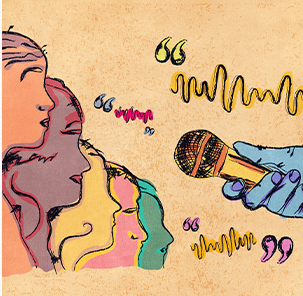Subscribe and receive the best Inkyfada podcasts straight to your mailbox.
Don't miss out! Subscribe to our newsletter to receive the latest Inkyfada podcasts.
Thanks for your inscription
Unsubscribe at any time

In this last episode of the series, we analyze - through the observations of Hajer Zarrouk, Doctor in communication, Wahid Ferchichi, Jurist, Sondes Garbouj, Psychologist and Nouri Lajmi, President of HAICA - how the media treats violence against women and femicide as well as its impact on the victims, their loved ones and the society as a whole.
The role of the media is crucial, they are heard, read, watched and thus have a tangible impact on public opinion. They can be content with reflecting the collective mentality and never questioning it or, conversely, they can sensitize the public opinion and introduce ethical and professional values as well as human rights, especially when it comes to issues as challenging as violence against women.
Unfortunately, most of them prefer to play the mirror role in order to make profit. " These programs aim to create a buzz and generate the maximum number of viewers and therefore the maximum amount of money possible" explains Hajer Zarrouk, PhD student in communication. And this is done by turning the real life experiences of women victims of violence who come to confide in us into a source of entertainment, "the applause and laughter mean that we agree with what the aggressor says, that we are totally on board with what they do and that we even encourage them to reoffend", warns the PhD student.
These actions have tragic consequences on the victims and their loved ones, who end up doubting their status as victims and are reluctant to file a complaint. Since the establishment of HAICA and the enactment of Law 58, there is a willingness to educate the media and to sanction this type of discourse. However, these measures have been met with resistance from the main parties concerned.
Inkyfada Podcast is the first platform entirely dedicated to original Tunisian podcasts, and was conceived by Inkyfada media in collaboration with the in-house research and development laboratory, InkyLab. Inkyfada joined the global podcast boom in 2017, when the team produced the first Tunisian audio documentary, diving deep into the belly of the El Kamour struggle taking place in the desert. Since then, Inkyfada Podcast has produced a wide variety of documentaries, investigations, and podcast series, as well as articles accompanied by music; covering a multitude of contemporary issues in order to offer an immersive and alternative podcast experience. Whilst exclusively offering audio content, the Inkyfada Podcast team upholds the same core values and principles of inkyfada.com, and is committed to producing high quality content though a dynamic and meticulous production process. In addition to the permanent team, Inkyfada podcast works closely with various journalists, artists, illustrators, musicians and other content creators in order to diversify the platform and support artistic creativity. These podcasts differ from traditional radiophonic content in that the applied production and editing process is more akin to cinematographic techniques, in addition to being web-based, downloadable and accessible on demand. Additionally, Inkyfada Podcast uniquely offers subtitles in French, Arabic and English for all audio content, the majority of which is recorded in Tunisian or in the preferred language of the speaker in question.